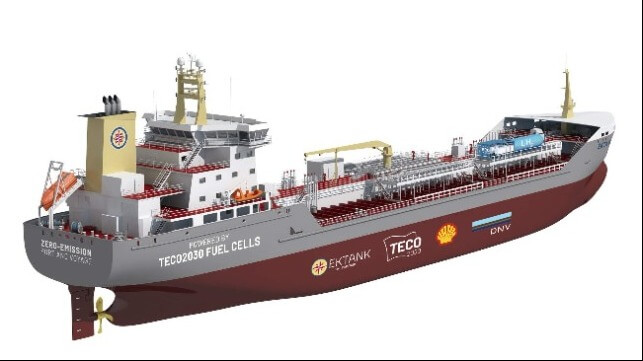Retrofitting Tankers to Achieve First Mover Status with Hydrogen

In a newly revealed project, oil shipping companies Shell Shipping and Maritime and Sweden’s Ektank are joining with Norwegian technology company Teco 2030 to develop a hydrogen-powered tanker concept designed to help the shipping industry meet the European Union’s goals on greenhouse gas emissions. To achieve first mover status in the industry they are initially focusing on retrofitting the concept to one of Ektank’s existing vessels. DNV will also participate in the project adding its expertise as classification society for the tankers.
The companies believe there is an ever-increasing need for technological innovation in zero-emission solutions developed for maritime transport. In particular, they highlight the need for retrofitting existing ships. Switching from traditional petroleum-based marine fuels to zero-carbon alternatives such as hydrogen they recognize could drastically shrink shipping’s climate impact if the technologies can be developed to support the existing ships.
“We are pleased to contribute with our high-quality and energy-efficient vessels towards the development of zero-emission technologies to meet environmental demands and regulations,” says Jörgen Johnsson, CEO of Ektank AB. “We are delighted with how suitable our vessels fit into the concept of Hy-Ekotank which is aligned perfectly with our Company’s environmental strategy.”
Ektank operates a fleet of five modern tankers. The two oldest were built in 2003 and 2004 and are each 13,700 dwt. The company also has a larger 17,000 dwt tanker built in 2009, Its newest vessels entered service in 2018 and both are 19,900 dwt. The tankers are mainly trading in northern Europe with refined oil products and all of them were built for rough conditions in the Baltic Sea with ice class 1A.
The proposed concept, called the Hy-Ekotank, plans a retrofit installation of fuel cells with compressed or liquid hydrogen storage on existing Ektank vessels. The goal is to eliminate emissions in port and reduce up to 100 percent of GHG emissions on voyages.
“We are humbled to work on Hy-Ekotank with Ektank, Shell, and DNV, as we believe these partners are a perfect match,” says Tore Enger, Group CEO, TECO 2030. “With a cargo owner, shipowner, classification society, and a fuel cell provider, we will show the world what hydrogen is capable of doing for the maritime shipping industry.”

that matters most
Get the latest maritime news delivered to your inbox daily.
Teco 2030 has been focusing on the maritime industry as one of the key areas for conversion to hydrogen propulsion. In addition to this project, in January 2022, Teco 2030 and Gen2 Energy signed a Memorandum of Understanding to cooperate on projects where green hydrogen is needed for fuel cells. They plan to focus their initial efforts on the supply of green hydrogen from Gen2 Energy for relevant projects where customers need hydrogen and power conversion through fuel cells either in ports, offshore fish farms, or other heavy-duty customers. Further, Gen2 Energy will involve Teco 2030 Marine Fuel Cells in Gen2 Energy’s seaborn value chain, allowing hydrogen to be transported onboard vessels powered by hydrogen fuel cells.
Last year, Teco 2030 also announced that it was working with Chart Industries to jointly develop technological solutions that will capture carbon dioxide emitted by ships and subsequently store it in liquid form. The system would be incorporated into the funnel emission systems and the captured CO2 would either be permanently stored in geological formations underground or be put to beneficial use in CO2-consuming industries, such as the agricultural, industrial, energy, or food and beverage sectors.
